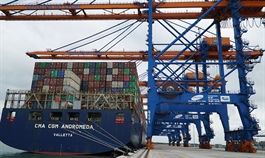Foreign shipping lines impose irrational fees
Foreign shipping lines impose irrational fees
Foreign shipping lines have irrationally imposed several fees and created headaches for domestic exporters, an inspection team has concluded.
A foreign cargo ship at Cai Mep-Thi Vai port in the southern province of Ba Ria Vung Tau. Photo by VnExpress/Anh Duy.
|
The Vietnam Marine Administration has reported the findings to the Transport Ministry.
The inspection team studied the practices of 10 foreign shipping lines – MSC, OOCL, CMA - CGM, Hapag - Lloyd, ONE, Evergreen, HMM, Maersk Lines and Yangming – between March and May after they rampantly increased freights and surcharges.
According to the administration, sea freight started to surge in October 2020, especially on routes to Europe and North America. In April 2021, the freight for a 40-foot container from Vietnam to Europe was $6,500-8,000, and for a 20-foot container to America, $6,000-7,000; an increase of 5-7 times over late last year.
The key reason for the hike was China’s economic recovery after being hard hit by Covid-19. A large number of empty containers were booked by China, resulting reduced supply and increased demand, and in turn, higher freights.
The shipping team found that the shipping lines listed freights on their websites but did not display the time of listing, so it was impossible to know when those came into force. The shipping firms even applied floating freights for small customers without long-term contracts.
In addition to increasing freights, the shipping lines applied 3-5 surcharges for goods loading and unloading, container cleaning, documentation and lead sealing. Up to 9 shipping firms imposed loading and uploading surcharges of $100-170 per container. Some firms applied feels like petrol surcharges infrequently.
The team said the shipping lines imposed surcharges without agreements with customers, and without explaining the reason or announcing a time frame it.
The firms also applied a Verified Gross Mass (VGM) fee of $30-50, but they did not have to pay it the inspection time found.
It is difficult to monitor surcharges because shipping lines do not have to declare these to agencies.
"Shipping lines decide freights and surcharges themselves. Small and seasonal Vietnamese customers have no plans to sign long-term shipment contracts, so they face many risks amid volatile markets," the inspection report said.
Shipping lines do not have to register transport routes, so they are free to add or remove ships from them, which poses a risk to local exporters.
The administration has proposed the Finance Ministry to consider amending regulations on freights and surcharges of shipping lines imposed at Vietnamese ports. It has also proposed the Transport Ministry to issue new regulations on registering transport routes, schedules and cargo volumes in Vietnam to prevent shipping lines from unilaterally delaying or quitting voyages, or cancelling space bookings, and to increase punishments for freight listing violations.
Some 40 shipping lines frequently operate in Vietnam, securing a lion’s share of 95 percent of the country’s import-export transport. Vietnamese shipping firms have not been able to run routes to Europe and North America.
Nine shipping lines inspected by the teams currently run routes from Lach Huyen Seaport in the northern city of Hai Phong and from Cai Mep-Thi Vai Seaport in the southern province of Ba Ria Vung Tau to Europe with 2 voyages a week, and 18 voyages to North America.
Foreign shipping lines typically have representatives in Vietnam in the form of wholly foreign-owned enterprises.






















